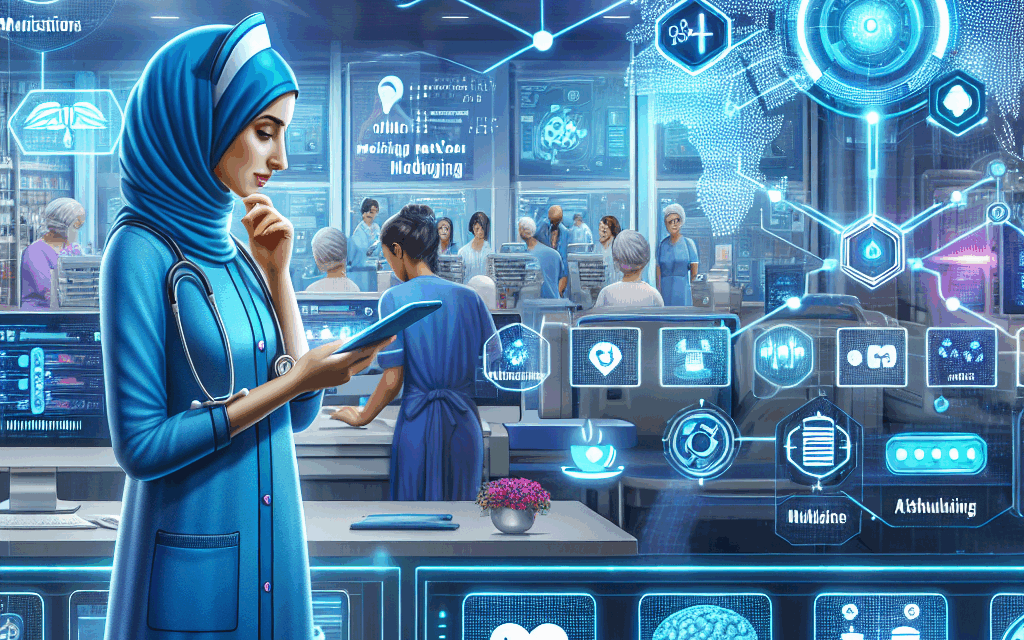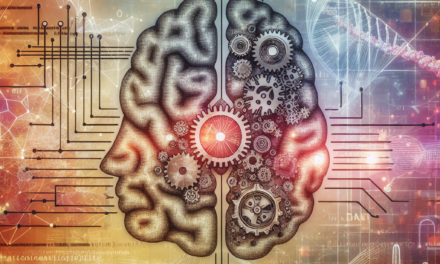Navigating AI in Nursing: Current Uses and Challenges Ahead
Artificial Intelligence (AI) is revolutionizing various sectors, and healthcare is no exception. In nursing, AI technologies are being integrated into practice to enhance patient care, streamline operations, and improve outcomes. However, the adoption of AI in nursing also presents unique challenges that must be navigated carefully. This article explores the current uses of AI in nursing, the benefits it brings, the challenges faced, and the future implications for the nursing profession.
1. Current Uses of AI in Nursing
AI is being utilized in nursing in various ways, from administrative tasks to direct patient care. The integration of AI technologies is aimed at improving efficiency, accuracy, and patient outcomes. Here are some of the most prominent applications:
- Predictive Analytics: AI algorithms analyze patient data to predict health outcomes, allowing nurses to intervene proactively.
- Robotic Process Automation (RPA): RPA is used to automate repetitive administrative tasks, freeing up nurses to focus on patient care.
- Telehealth and Virtual Assistants: AI-powered chatbots and virtual assistants provide patients with immediate responses to their queries, enhancing access to care.
- Clinical Decision Support Systems (CDSS): These systems assist nurses in making informed decisions by providing evidence-based recommendations.
- Patient Monitoring Systems: AI technologies are used in remote patient monitoring to track vital signs and alert healthcare providers to potential issues.
Predictive Analytics in Nursing
Predictive analytics is one of the most transformative uses of AI in nursing. By analyzing vast amounts of patient data, AI can identify patterns and predict potential health issues before they arise. For instance, a study published in the journal *Nursing Management* highlighted how predictive analytics could forecast patient deterioration, allowing nurses to intervene earlier and potentially save lives.
Hospitals are increasingly adopting predictive analytics tools to manage patient flow and reduce readmission rates. For example, the University of Pennsylvania Health System implemented a predictive model that reduced readmissions by 20% by identifying high-risk patients and providing targeted interventions.
Robotic Process Automation (RPA)
RPA is another area where AI is making significant inroads in nursing. By automating routine administrative tasks such as scheduling, billing, and data entry, RPA allows nurses to dedicate more time to direct patient care. A report from the American Nurses Association indicated that nurses spend nearly 30% of their time on administrative tasks, which could be significantly reduced through RPA.
For instance, the use of RPA in a large healthcare system in Texas led to a 50% reduction in time spent on patient registration processes. This not only improved efficiency but also enhanced patient satisfaction as nurses could spend more time with patients rather than paperwork.
Telehealth and Virtual Assistants
The COVID-19 pandemic accelerated the adoption of telehealth services, and AI has played a crucial role in this transition. AI-powered virtual assistants and chatbots are being used to triage patients, provide health information, and schedule appointments. This technology has proven particularly beneficial in rural areas where access to healthcare is limited.
A case study from a telehealth provider showed that the implementation of an AI chatbot reduced wait times for patients by 40%, allowing for quicker access to care. Additionally, these virtual assistants can provide 24/7 support, ensuring that patients receive timely information and assistance.
Clinical Decision Support Systems (CDSS)
CDSS are AI-driven tools that provide nurses with evidence-based recommendations to support clinical decision-making. These systems analyze patient data and medical literature to offer insights that can improve patient outcomes. For example, a study published in *The Journal of Nursing Administration* found that the use of CDSS led to a 15% increase in adherence to clinical guidelines among nurses.
One notable example is the use of CDSS in medication management. By analyzing patient records, these systems can alert nurses to potential drug interactions or allergies, reducing the risk of adverse events. This not only enhances patient safety but also empowers nurses to make informed decisions.
Patient Monitoring Systems
AI technologies are also being utilized in patient monitoring systems, particularly in critical care settings. These systems continuously track vital signs and other health indicators, alerting nurses to any abnormalities that may require immediate attention. A study published in *Critical Care Medicine* demonstrated that AI-enhanced monitoring systems could detect early signs of sepsis with 90% accuracy, allowing for timely intervention.
Moreover, remote patient monitoring has gained traction, especially during the pandemic. Patients can be monitored from home, reducing the need for hospital visits while still ensuring that healthcare providers have access to real-time data. This approach not only improves patient outcomes but also alleviates the burden on healthcare facilities.
2. Benefits of AI in Nursing
The integration of AI in nursing offers numerous benefits that can enhance patient care and improve operational efficiency. Here are some of the key advantages:
- Improved Patient Outcomes: AI can lead to better health outcomes through early detection and intervention.
- Increased Efficiency: Automation of administrative tasks allows nurses to focus more on patient care.
- Enhanced Decision-Making: AI provides evidence-based recommendations that support clinical decision-making.
- Cost Savings: Reducing readmissions and improving operational efficiency can lead to significant cost savings for healthcare organizations.
- Personalized Care: AI can help tailor treatment plans to individual patients based on their unique data.
Improved Patient Outcomes
One of the most significant benefits of AI in nursing is the potential for improved patient outcomes. By leveraging predictive analytics and monitoring systems, nurses can identify at-risk patients and intervene before complications arise. For example, a study conducted at a major hospital in California found that the implementation of an AI-driven early warning system reduced the incidence of cardiac arrest by 30%.
Furthermore, AI can enhance the quality of care provided to patients. For instance, AI algorithms can analyze patient data to recommend personalized treatment plans, ensuring that each patient receives care tailored to their specific needs. This level of personalization can lead to better adherence to treatment protocols and improved health outcomes.
Increased Efficiency
AI technologies can significantly increase efficiency in nursing by automating routine tasks. By reducing the time spent on administrative duties, nurses can devote more time to direct patient care. A study published in *Health Affairs* found that hospitals that implemented AI-driven automation saw a 25% increase in nursing productivity.
For example, a healthcare organization in New York implemented an AI system to streamline patient scheduling and registration processes. As a result, nurses reported spending 40% less time on administrative tasks, allowing them to focus on providing high-quality care to their patients.
Enhanced Decision-Making
AI provides nurses with access to vast amounts of data and evidence-based recommendations that can enhance clinical decision-making. By utilizing CDSS, nurses can make informed choices that improve patient safety and outcomes. A study published in *The Journal of the American Medical Association* found that the use of CDSS led to a 20% reduction in medication errors among nurses.
Moreover, AI can assist nurses in staying up-to-date with the latest medical research and guidelines. By analyzing current literature and clinical data, AI systems can provide real-time recommendations that align with best practices, ensuring that nurses are equipped to deliver the highest standard of care.
Cost Savings
The integration of AI in nursing can lead to significant cost savings for healthcare organizations. By reducing readmission rates and improving operational efficiency, hospitals can lower their overall expenses. A report from the McKinsey Global Institute estimated that AI could save the healthcare industry up to $150 billion annually by 2026 through improved efficiency and reduced costs.
For instance, a healthcare system in Florida implemented an AI-driven predictive analytics tool that reduced readmissions by 25%. This not only improved patient outcomes but also saved the organization millions of dollars in avoidable costs.
Personalized Care
AI enables nurses to provide personalized care by analyzing individual patient data and tailoring treatment plans accordingly. This approach ensures that patients receive care that is specific to their unique needs, leading to better adherence and outcomes. A study published in *The Lancet* found that personalized treatment plans developed with the help of AI led to a 15% improvement in patient satisfaction scores.
For example, AI algorithms can analyze genetic data, lifestyle factors, and medical history to recommend personalized medication regimens. This level of customization not only enhances patient engagement but also improves overall health outcomes.
3. Challenges of AI in Nursing
Despite the numerous benefits of AI in nursing, several challenges must be addressed to ensure successful implementation. These challenges include:
- Data Privacy and Security: The use of AI requires access to sensitive patient data, raising concerns about privacy and security.
- Integration with Existing Systems: Integrating AI technologies with existing healthcare systems can be complex and costly.
- Training and Education: Nurses must be adequately trained to use AI tools effectively.
- Ethical Considerations: The use of AI raises ethical questions regarding decision-making and accountability.
- Resistance to Change: Some healthcare professionals may resist adopting AI technologies due to fear of job displacement or skepticism about their effectiveness.
Data Privacy and Security
One of the most pressing challenges of AI in nursing is ensuring data privacy and security. The use of AI requires access to vast amounts of sensitive patient data, which raises concerns about potential breaches and unauthorized access. According to a report from the Ponemon Institute, healthcare organizations experience the highest average cost per data breach, amounting to $4.35 million.
To mitigate these risks, healthcare organizations must implement robust cybersecurity measures and comply with regulations such as the Health Insurance Portability and Accountability Act (HIPAA). This includes encrypting patient data, conducting regular security audits, and providing staff training on data protection practices.
Integration with Existing Systems
Integrating AI technologies with existing healthcare systems can be a complex and costly endeavor. Many healthcare organizations rely on legacy systems that may not be compatible with new AI tools. A study published in *Health Information Science and Systems* found that 60% of healthcare organizations reported challenges in integrating AI with their existing IT infrastructure.
To overcome this challenge, healthcare organizations must invest in modernizing their IT systems and ensuring interoperability between different technologies. This may involve collaborating with technology vendors to develop customized solutions that meet the specific needs of the organization.
Training and Education
For AI to be effectively integrated into nursing practice, nurses must receive adequate training and education on how to use these technologies. A survey conducted by the American Nurses Association revealed that 70% of nurses felt unprepared to use AI tools in their practice.
To address this gap, nursing education programs must incorporate AI training into their curricula, and healthcare organizations should provide ongoing professional development opportunities for nurses. This will ensure that nurses are equipped with the skills and knowledge needed to leverage AI effectively in their practice.
Ethical Considerations
The use of AI in nursing raises several ethical considerations, particularly regarding decision-making and accountability. As AI systems become more autonomous, questions arise about who is responsible for decisions made by these technologies. A study published in *The Hastings Center Report* highlighted the need for clear guidelines on the ethical use of AI in healthcare.
Healthcare organizations must establish ethical frameworks that address issues such as informed consent, transparency, and accountability. This includes ensuring that patients are aware of how their data is being used and that they have the right to opt-out of AI-driven interventions if they choose.
Resistance to Change
Resistance to change is a common challenge in healthcare, and the adoption of AI technologies is no exception. Some healthcare professionals may fear that AI will replace their jobs or question the effectiveness of these tools. A survey conducted by Deloitte found that 40% of healthcare workers expressed concerns about job displacement due to automation.
To overcome this resistance, healthcare organizations must foster a culture of innovation and emphasize the complementary role of AI in enhancing nursing practice. By highlighting the benefits of AI and involving nurses in the decision-making process, organizations can encourage acceptance and adoption of these technologies.
4. The Future of AI in Nursing
The future of AI in nursing holds great promise, with the potential to transform the profession and improve patient care. As technology continues to evolve, several trends are likely to shape the future landscape of AI in nursing:
- Increased Personalization: AI will enable even greater personalization of care through advanced data analytics.
- Enhanced Collaboration: AI will facilitate collaboration between healthcare professionals, improving communication and teamwork.
- Expansion of Telehealth: The use of AI in telehealth will continue to grow, providing patients with greater access to care.
- Focus on Preventive Care: AI will play a crucial role in shifting the focus from reactive to preventive care.
- Continuous Learning: AI systems will evolve through continuous learning, improving their accuracy and effectiveness over time.
Increased Personalization
As AI technologies advance, the ability to provide personalized care will become even more sophisticated. Future AI systems will analyze a wider range of data, including genetic information, lifestyle factors, and social determinants of health, to develop tailored treatment plans for individual patients. This level of personalization will enhance patient engagement and adherence to treatment protocols, ultimately leading to better health outcomes.
For example, AI algorithms may be able to predict how a patient will respond to a specific medication based on their genetic makeup, allowing for more effective and targeted treatments. This shift towards personalized medicine will empower nurses to deliver care that is truly centered around the individual patient.
Enhanced Collaboration
The future of AI in nursing will also see enhanced collaboration among healthcare professionals. AI technologies will facilitate communication and information sharing, allowing nurses, physicians, and other team members to work together more effectively. For instance, AI-driven platforms may enable real-time sharing of patient data, ensuring that all members of the care team have access to the most up-to-date information.
This collaborative approach will improve care coordination and reduce the risk of errors, ultimately leading to better patient outcomes. A study published in *The Journal of Interprofessional Care* found that enhanced collaboration among healthcare professionals resulted in a 30% reduction in adverse events.
Expansion of Telehealth
The COVID-19 pandemic has accelerated the adoption of telehealth services, and this trend is expected to continue in the future. AI will play a crucial role in expanding telehealth capabilities, enabling healthcare providers to deliver care remotely while maintaining high standards of quality. AI-powered virtual assistants and chatbots will enhance patient engagement and provide immediate support, ensuring that patients receive timely care.
Moreover, AI technologies will enable remote monitoring of patients with chronic conditions, allowing for proactive management and reducing the need for hospital visits. A report from the American Telemedicine Association projected that telehealth usage will continue to grow, with an estimated 25% of all healthcare visits being conducted virtually by 2025.
Focus on Preventive Care
The future of AI in nursing will also emphasize preventive care, shifting the focus from reactive interventions to proactive health management. AI technologies will enable healthcare providers to identify at-risk patients and implement preventive measures before health issues arise. For example, predictive analytics can be used to identify patients who may benefit from lifestyle interventions, such as weight management or smoking cessation programs.
This proactive approach will not only improve patient outcomes but also reduce healthcare costs by preventing the development of chronic conditions. A study published in *Health Affairs* found that investing in preventive care can save the healthcare system up to $3 trillion annually by reducing the burden of chronic diseases.
Continuous Learning
AI systems will continue to evolve through continuous learning, improving their accuracy and effectiveness over time. As more data becomes available, AI algorithms will be able to refine their predictions and recommendations, leading to better decision-making in nursing practice. This continuous learning process will ensure that AI technologies remain relevant and effective in addressing the changing needs of patients and healthcare providers.
For instance, machine learning algorithms can analyze patient outcomes to identify which interventions are most effective for specific populations. This data-driven approach will empower nurses to make informed decisions that align with best practices and improve patient care.
5. Conclusion: Embracing the Future of AI in Nursing
The integration of AI in nursing presents both opportunities and challenges. While AI technologies have the potential to enhance patient care, improve efficiency, and reduce costs, healthcare organizations must navigate the complexities of implementation carefully. Addressing challenges such as data privacy, integration with existing systems, and training will be crucial for successful adoption.
As the nursing profession continues to evolve, embracing AI will be essential for delivering high-quality care in an increasingly complex healthcare landscape. By leveraging the power of AI, nurses can enhance their practice, improve patient outcomes, and contribute to a more efficient healthcare system.
In summary, the future of AI in nursing is bright, with the potential for increased personalization, enhanced collaboration, expanded telehealth services, a focus on preventive care, and continuous learning. By embracing these advancements, nurses can position themselves at the forefront of healthcare innovation, ultimately benefiting both patients and the healthcare system as a whole.





